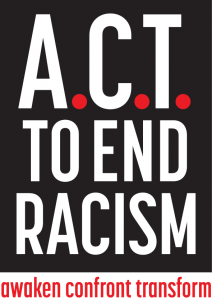The National Council of the Churches of Christ in the USA and our partners gathered in Washington, D.C. in 2018 for an historic event to launch its Truth and Racial Justice Initiative. As we mark 50 years since the assassination of Rev. Dr. Martin Luther King Jr. on April 4, 1968, we will commit to do our part to eradicate the entrenched racism that grips the United States and paralyzes our ability to see every human being as equal.

We challenge ourselves and our communities to join in truth-telling, leading to actions that right the wrongs, and, with God’s grace, bring healing and wholeness to all people, and unity to the nation.
- AWAKEN ourselves to the truth that racism is ever-present, deeply rooted in American culture, and profoundly damaging to our communities.
- CONFRONT racism, speak truth to ourselves, our communities and institutions, and stand against injustice.
- TRANSFORM the hearts, minds, and behaviors of people and structures that shape society.
Vision and Objectives of A.C.T. Now
 The National Council of Churches professes that the image of God is found equally in each person (Gen 1:26). All are called by God to treat each other with dignity and love (Mk 12:31). Yet, the sin of racism – a distortion of human value, and a church-dividing issue[1]– continues to grip the United States of America.
The National Council of Churches professes that the image of God is found equally in each person (Gen 1:26). All are called by God to treat each other with dignity and love (Mk 12:31). Yet, the sin of racism – a distortion of human value, and a church-dividing issue[1]– continues to grip the United States of America.
Contrary to the will of God, the legacies of slavery are embedded in U.S. laws and practices. To this day, distribution of wealth and power is filtered unjustly through largely white controlling interests. The National Council of Churches admits to the painful truth James Cone stated in his landmark essay Theology’s Great Sin: Silence in the Face of White Supremacy: the collective silence of the church through enslavement, Jim Crow, and the criminalization of communities of color, renders church people complicit with the evil of racism. In the face of such injustice, the church – sometimes silent, sometimes intentionally involved – is called, along with all who benefit from this system, to take reparative action.
This is the moment. The World Council of Churches, as part of its “Pilgrimage of Justice and Peace,” has called the U.S. churches to grapple with issues of racism particularly facing the African American community. The United Nations declared 2015-2024 as The International Decade for People of African Descent, noting: “the international community is recognizing that people of African descent represent a distinct group whose human rights must be promoted and protected. Around 200 million people identifying themselves as being of African descent live in the Americas.”[2] The time is right for the National Council of Churches to join other partners seeking to identify, name, and address the trauma caused by racism in the United States – especially as it impacts people of African descent. In an effort, then, to eradicate racism, and to move toward healing the wounds it has caused in society and church, the National Council of Churches seeks to engage the full agency of its members and partners as a resource for inspiring clear commitments to racial equity and justice.
The National Council of Churches believes that a thorough and true story of racism and racial injustice in our nation must be told and heard; that the complicity of white church members and leadership, and the impact of that complicity on faith communities of color, has not yet been fully recognized in white communities. The National Council of Churches believes that healing cannot be achieved without a complete confession of the truth as a prelude to reparative action and restorative justice.
In an effort to break the silence;
In an effort to begin healing;
In an effort to exercise full agency together;
In an effort to partner in building God’s justice;
In an effort to eradicate racism and unfold greater racial equity and justice in our time:
The National Council of Churches urges our partners to join in this work. Some will find it necessary to prepare a record of their complicity with racism through acts of commission or omission. Some will document suffering and exploitation experienced at the hands of those who brokered in race hate. Others may bring forth testimonies of hope based on acts of courage and righteousness in the historical struggle for justice. Still others may speak out of an ethnic identity that is neither white nor black. This is a commitment that brings us together to seek healing for the church, the nation and wholeness for all God’s people.
In all cases, this truth telling is but a prelude to deeper commitments to begin a healing process that, through the grace of God and the everlasting hope of the Risen Christ, can lead to the original dream of this great land: that all are created equal, free to live under the watchful eye of a Creator who endowed all with an inalienable right to a full life, a complete liberty, and the pursuit of happiness for each and all.
